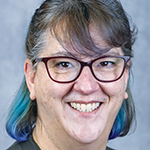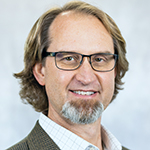When patients enter a Catholic hospital such as Providence Little Company of Mary Medical Center in Torrance, California, they are greeted with religious symbols that may not be part of their own faith tradition.


But Lead Chaplain Aviva Levin, who works with Spiritual Care Manager Paul White to oversee an interfaith team of chaplains at Little Company of Mary, is working to ensure that every patient — regardless of faith — feels cared for and welcomed with open arms. As part of that mission, Levin created a program called "Faith-full Fridays" to make sure she and her colleagues are meeting the unique needs of non-Catholic patients, including those who identify as Jewish, Muslim, Hindu, agnostic and atheist.
"When I got here, I heard conversations from leadership about their desire to articulate to faith communities outside of the Catholic Church that this is a hospital, first and foremost," said Levin, who is Jewish. "Yes, we have crucifixes, but that doesn't get in the way of first-class medical treatment. But how do we communicate that so that people of other faiths are not afraid to walk in the front door?"
Bringing positive energy to healing
Levin joined Little Company of Mary, part of Providence St. Joseph Health, in 2021 after completing her training in clinical pastoral education. During her training at a hospital that is not faith-based,
she had witnessed a program in which Jewish patients were provided a prayer sheet and challah bread. Knowing that Fridays are uniquely sacred to those who identify as Jewish and Muslim, she proposed Faith-full Fridays as a way to help those patients
observe certain rituals that might bring peace and positive energy to their healing.
On Faith-full Fridays, chaplains deliver special bags to new patients who identify as Jewish or Muslim: Shabbat bags for Jewish patients that include battery-operated tea lights, kosher grape juice and a bread roll to help them observe the Sabbath; and prayer beads for Muslim patients along with a booklet with blessings and prayers from the Quran for health and healing.
"It's such an amazing gift to be able to do this work," Levin said. "The fact that a Catholic health ministry has a female Jewish lead chaplain and embraces my kooky ideas and my desires to go in and make this the best experience possible for patients and their caregivers, is just such a gift."
"It's such an amazing gift to be able to do this work. The fact that a Catholic health ministry has a female Jewish lead chaplain and embraces my kooky ideas and my desires to go in and make this the best experience possible for patients and their caregivers, is just such a gift." — Aviva Levin
Levin said chaplains also provide special resources for Buddhist and Hindu patients. If a patient identifies as nonreligious, they offer support through guided meditations, music, art, nature — whatever might help that person find meaning and connection and feel cared for without judgment. A Catholic priest chaplain attends to the sacramental needs of Catholic patients and their loved ones.
"Wherever you are on the spectrum, we're here to support you," Levin said. "We're saying: 'Hey, we really see you,' and we are upholding the Providence promise to 'know me, care for me, ease my way.'"
Finding unity among people of different faiths
The Faith-full Fridays program has been adopted at Little Company of Mary Medical Center in San Pedro, California, as well. White, manager of spiritual care at both Little Company of
Mary hospitals, said the response at each medical center has been overwhelmingly positive.
"In a Catholic health care system such as Providence it is the norm to have Catholic and Protestant chaplains," he said. "It is more unusual to have a chaplain who is Jewish. And even more unusual to have chaplains who are Jewish and Muslim, which we do."
White said that while society in general has become less religious and the faith tradition of the chaplain seems to matter less to patients, there is a genuine appreciation from Jewish and Muslim patients. "They express feeling seen in a place where they may have anticipated they would not be accepted," he said.
For Levin, coming to work every day in a place where crucifixes adorn each patient room has helped deepen her understanding of how different faiths can find unity.
"When we first initiated the Faith-full Friday program, I knocked on a Muslim gentleman's door and offered him his prayer beads. He froze," Levin recalled. "He looked at me, placed his right hand to his heart and said, 'I am a Muslim in a Catholic hospital receiving ritual support from a Jewish chaplain. Can you imagine such a thing?'
"And I said, 'I dream of the day when our faith is what brings us closer to one another as opposed to distant.' It just warmed my heart."
